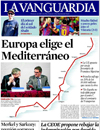
On 19 October, the European Commission presented its project for the integration of European transport networks. Endowed with a budget of 37.7 billion euros, it includes plans to modernise infrastructure and “rationalise cross border transport” by 2030. In individual countries, the initiative is being evaluated in terms of its national impact. In Spain, La Vanguardia leadswith the front-page headline “Europe chooses the Mediterranean,” and a report on the rail corridor that will link the French-Spanish border to Algéciras in southern Spain. The daily points out that its inclusion in the trans-European transport network will provide 20% of the funding for this coastal line, which will cost an estimated 19 billion euros. That is why “the Mediterranean corridor is a victory,” explains the editorial in the Catalan daily, which notes in passing that the principle that every rail link should pass through Madrid “has been amended.” Adding that “good sense has prevailed,” La Vanguardia points out that 40% of Spains GDP is generated by the Mediterranean regions of the country.
In northern Europe, Eesti Pävaleht insists that the project is a “clear green light” for the new “Rail Balitca” axis that will link Estonia to the Polish-Lithuanian border via Latvia. Plans for the route, which have been put forward by Estonia and Lithuania “appear tailor-made for the conditions required by Brussels,” writes the Estonian daily, which notes that this is the first time that “the EU has agreed to spend such significant sums on transport projects which are not designed to solely serve the needs of individual member states.” For the newspaper, the implementation of the Rail Baltica project will also put an end to the proposal for a high speed link between Riga and Moscow, which was put forward by former Latvian president Valdis Zatlers but later contested by Prime Minister Valdis Dombrovskis — in a move which highlights Latvia’s desire to stand back from its relationship with Russia.
Was this article useful? If so we are delighted!
It is freely available because we believe that the right to free and independent information is essential for democracy. But this right is not guaranteed forever, and independence comes at a cost. We need your support in order to continue publishing independent, multilingual news for all Europeans.
Discover our subscription offers and their exclusive benefits and become a member of our community now!











